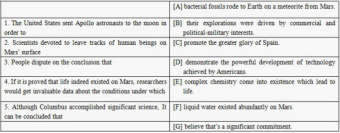For centuries, explorers have risked their lives venturing into the unknown for reasons that were to varying degrees economic and nationalistic. Columbus went west to look for better trade routes to the Orient and to promote the greater glory of Spain, Lewis and Clark journeyed into the American wilderness to find out what the U.S. had acquired when it purchased Louisiana, and the Apollo astronauts rocketed to the moon in a dramatic show of technological muscle during the cold war.
Although their missions blended commercial and political-military imperatives, the explorers involved all accomplished some significant science by going where no scientists had gone before.
Today Mars looms as humanity's next great terra incognita. And with doubtful prospects for a short-term financial return, with the cold war a rapidly fading memory and amid a growing emphasis on international cooperation in large space ventures, it is clear that imperatives other than profits or nationalism will have to compel human beings to leave their tracks on the planet's reddish surface. Could it be that science, which has long played a minor role in exploration, is at last destined to take a leading role? The question naturally invites a couple of others; Are there experiment that only human could do on Mars? Could those experiments provide insights profound enough to justify the expense of sending people across interplanetary space?
With Mars the scientific stakes are arguably higher than they have ever been. The issue of whether life ever existed on the planet, and whether it persists to this day, has been highlighted by mounting evidence that the Red Planet once had abundant stable, liquid water and by the continuing controversy over suggestions that bacterial fossils rode to Earth on a meteorite from Mars. A more conclusive answer about life on Mars, past or present, would give researchers invaluable data about the range of conditions under which a planet can generate the complex chemistry that leads to life. If it could be established that life arose independently on Mars and Earth, the finding would provide the first concrete clues in one of the deepest mysteries in all of science: the prevalence of life in the universe.

参考答案与解析:
-
相关试题
-
The firemen actedquickly because lives were [at] [stake].
-
[单选题]The firemen actedquickly because lives were [at] [stake].A.in dangerB.in de
- 查看答案
-
People have ______poverty and now they live happy lives.
-
[单选题]People have ______poverty and now they live happy lives.A.got tiredofB.got
- 查看答案
-
The high-speedtrains can have a major [impact] on our lives.
-
[单选题]The high-speedtrains can have a major [impact] on our lives.A.effortB.probl
- 查看答案
-
Many elephants were known to have perished of their wounds when there were no nature reserves.
-
[单选题]Many elephants were known to have perished of their wounds when there were
- 查看答案
-
The greatest recent changes have been in the lives of women. During the twentieth century there was
-
[单选题]The greatest recent changes have been in the lives of women. During the twe
- 查看答案
-
The greatest recent changes have been in the lives of women. During the twentieth century there was
-
[单选题]The greatest recent changes have been in the lives of women. During the twe
- 查看答案
-
The greatest recent changes have been in the lives of women. During the twentieth century there was
-
[单选题]The greatest recent changes have been in the lives of women. During the twe
- 查看答案
-
The greatest recent changes have been in the lives of women. During the twentieth century there was
-
[单选题]The greatest recent changes have been in the lives of women. During the twe
- 查看答案
-
The greatest recent changes have been in the lives of women. During the twentieth century there was
-
[单选题]The greatest recent changes have been in the lives of women. During the twe
- 查看答案
-
Reform and opening-up have brought about profound changes to the lives of the Chinese.
-
[单选题]Reform and opening-up have brought about profound changes to the lives of t
- 查看答案
